“What’s in a name?”
When a pining Juliet cited her famous speech in Romeo and Juliet, she may have been thinking of the field of onomastics, which is the branch of linguistics that deals with the study of names. The origins and usage of our surnames reveal extraordinary insights into the history and culture of different societies.
The Most Common Last Name in Every Country in the World
According to legend, surnames were first used in China in the year 2852 B.C. to aid the collection of census information. In Western Europe, the use of surnames became more common in the Middle Ages. The population of Europe increased significantly, which created a greater need for last names in order to to tell people apart.
The etymologies of surnames are generally sorted into five different categories:
- Occupational
- Personal description
- Toponymic, which means from a place name
- Patronymic, which means from the name of a father or ancestor
- Names signifying patronage
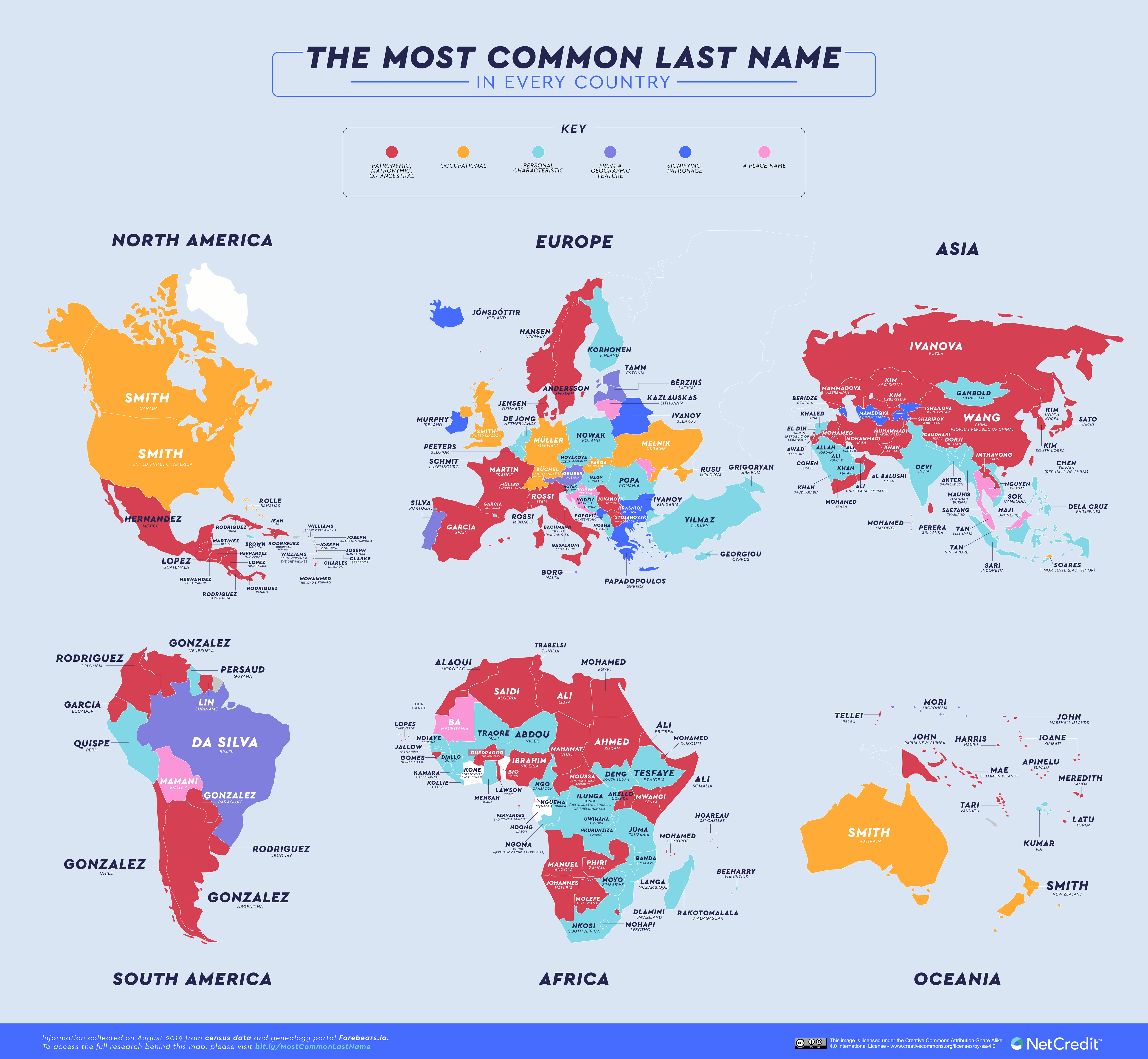
A series of six maps has been created which reveals the most common last name in every country in the world; and this article — which was written by Barbara Davidson from NetCredit — gives more details about them as per the methodology and sources for the information.
I have been given express written permission to use the images and the verbatim text from the aforementioned article in this article. How many last names in the maps do your recognize?
1. Africa
In Africa, most surnames are connected to geographic origin, occupation, lineage or personal characteristics. One surname-type unique to the continent is the praise-name, which expresses character traits or other admirable attributes. Ilunga, for example, is of Bantu origin. It roughly translates to “a person who is ready to forgive any abuse for the first time, to tolerate it a second time, but never a third time.” It is the most common surname in the Democratic Republic of the Congo.
Many people in Africa changed their names after gaining independence, but lots of popular surnames across the continent today still reflect the region’s colonial past. Cape Verde and Sao Tome and Principe were both colonies of Portugal and together gained independence in 1975. Today, the Portuguese name Fernandes is the most common surname in Cape Verde. Lopes, also a Portuguese name, is the most common surname in Sao Tome and Principe.
Muslims constitute around 30% of the population of sub-Saharan Africa, which likely explains the Islamic root of many African surnames. In Chad, Comoros, Djibouti, Egypt and Sudan, the most common last name is some variation or epithet of Muhammad, the founder of Islam, which also translates to “praiseworthy.”
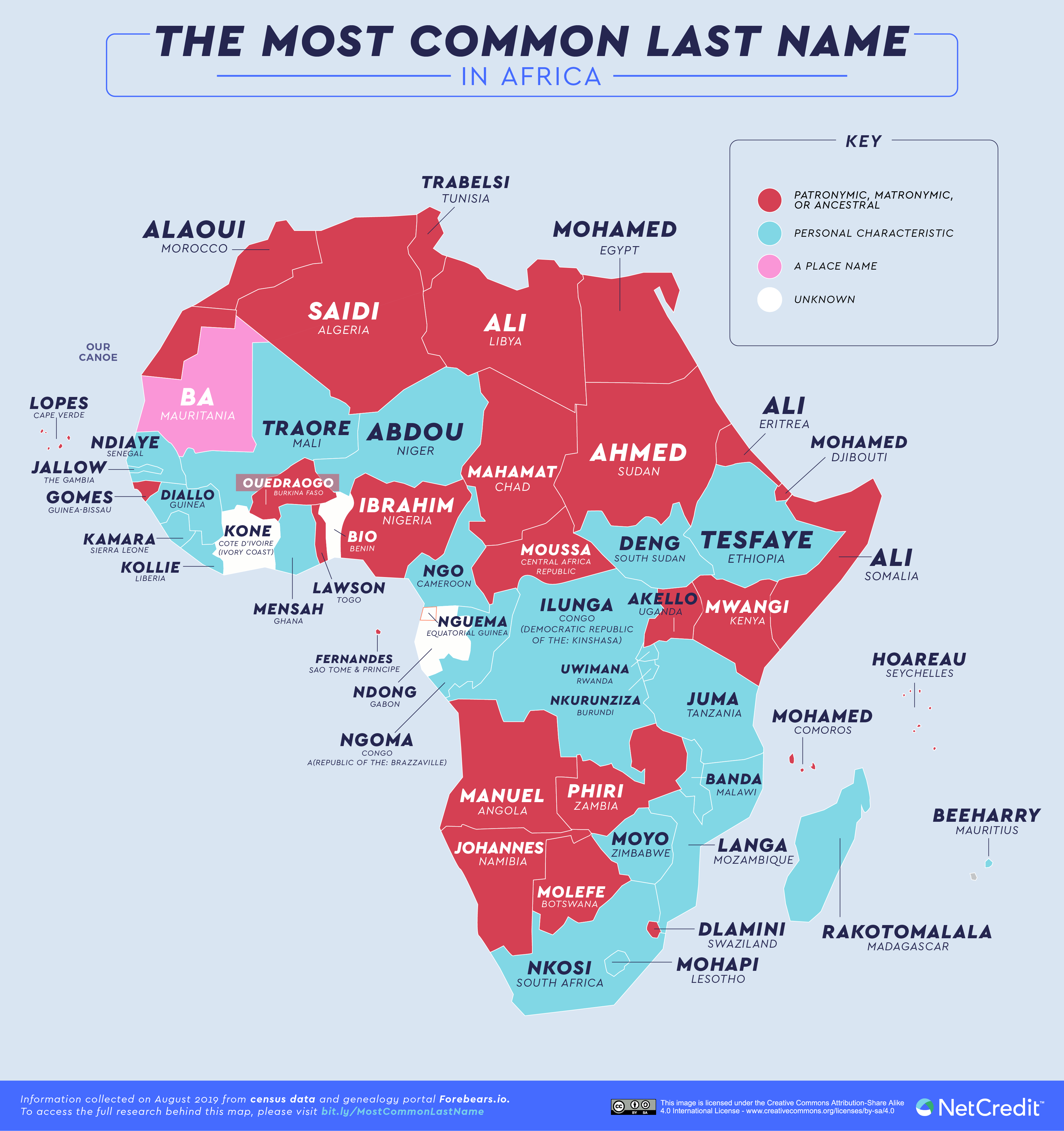
2. Asia
The distribution of surnames in Asia reflects the continent’s dynastic past. When a new dynasty took power, it was common for all subjects to adopt a name connected to the dynasty. The name Tan, for example, derives from ‘Chen,’ an important state during China’s long-running Zhou dynasty. Today, Tan is the most common surname in Malaysia and Singapore.
Similarly, the most common last name in Vietnam is Nguyen, which was the name of the last dynasty in Vietnam. Kim is the most common surname in North Korea and South Korea, as well as Kazakhstan and Uzbekistan. It may originate from over 600 different clans that use the Chinese character for Kim.
This common source of surnames in Southeast Asia may be one reason why there is less variation among last names than in other parts of the world. In China, Wang is shared by an estimated one in every 13 residents. In South Korea, one in five residents has the surname Kim. And in Vietnam, one in every four residents has the last name Nguyen.
By comparison, the most common surname in the United States, Smith, is shared by one in every 121 residents.
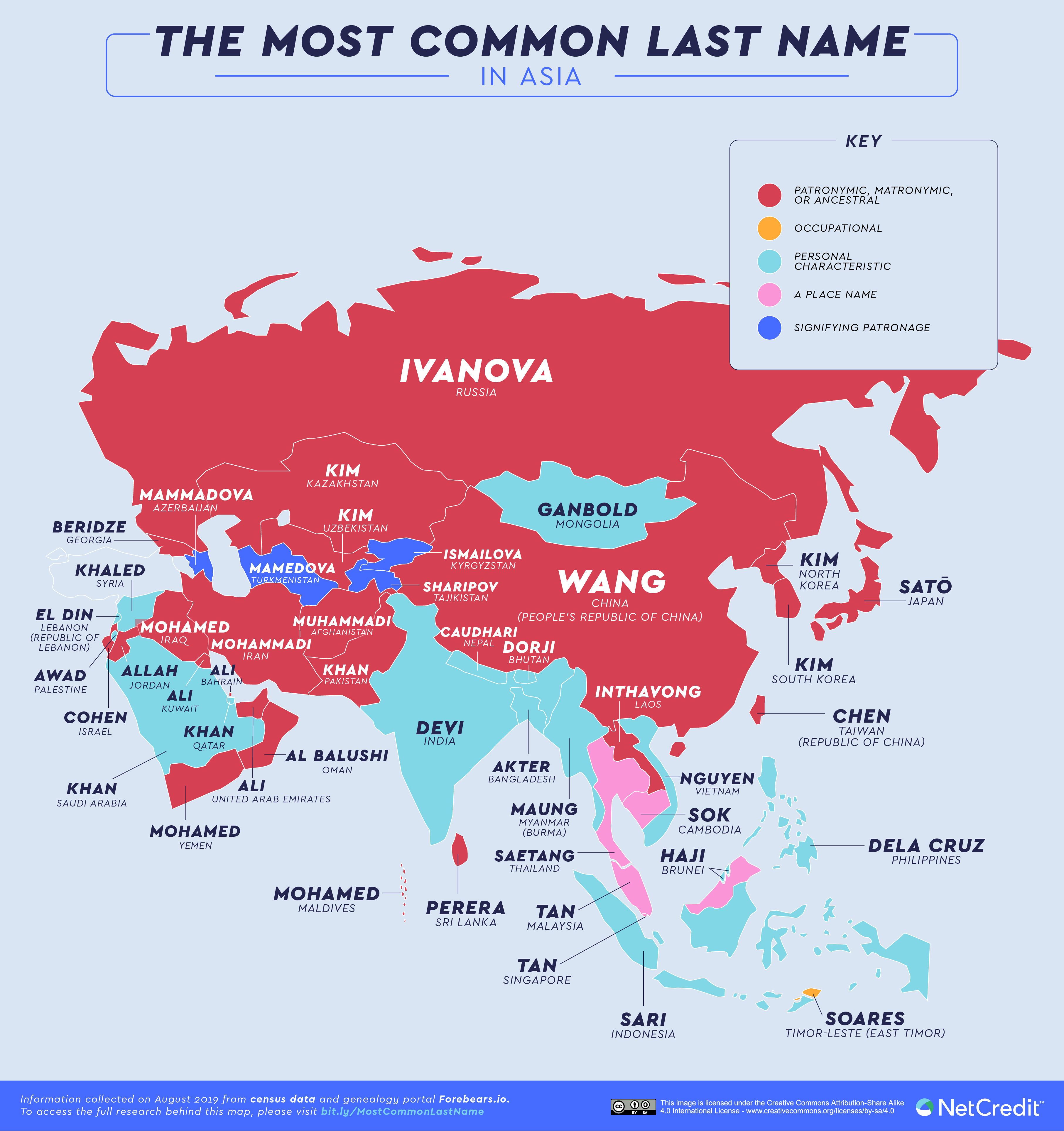
3. Europe
Compared to the rest of the world, Europeans are far more likely to have a name connected to an ancestor’s job. For example, the most popular surname in Luxembourg, Schmit, derives from the Middle High German “smit,” meaning “blacksmith.” Müller is the most common surname in Germany and Switzerland and is an occupational name for a miller.
European surnames also paint a picture of the continent’s diverse topography, since many describe the landscape where a person lived. In Austria, the most common surname is Gruber, which comes from the Middle High German “gruobe”, meaning “pit.” The name refers to someone who lives in a depression or hollow. Bērziņš, the most common surname in Latvia, derives from the Latvian “bērzs”, meaning “birch”, and denotes someone who lives among birch trees.
Patronymic suffixes are often a good way to tell which part of Europe someone is from. The Slavic “-ov”, as in Ivanov (son of Ivan), is common in Belarus and Bulgaria. The suffix “-sen”, as in Hansen in Norway and Jensen in Denmark, is still commonly found among descendants of Scandinavian families who immigrated to America in the 19th century.
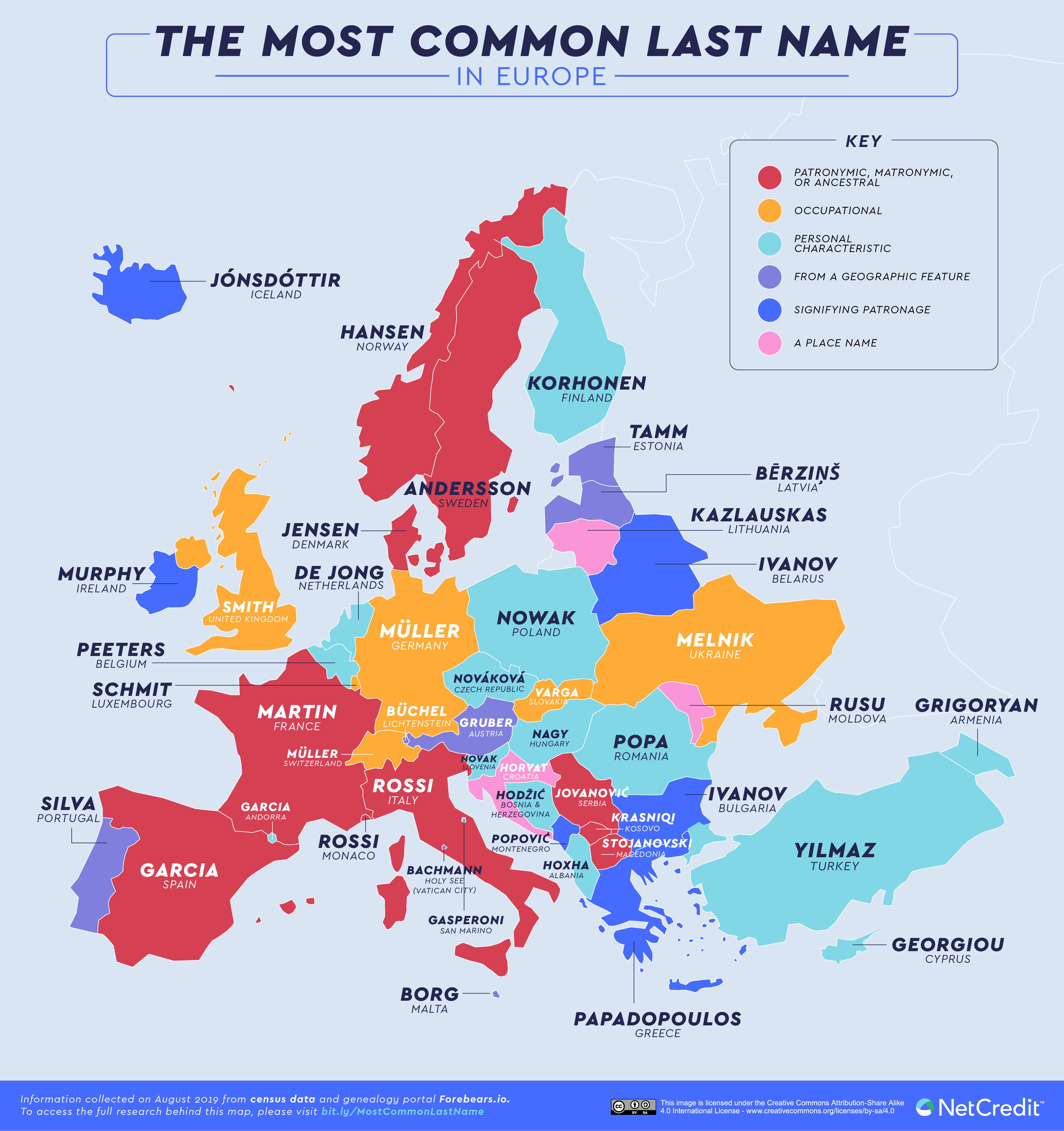
4. North America
Surnames in Central America and the Caribbean reflect the region’s colonial history. Haiti was a French colony from 1697 to 1804, and the most common last name is Jean, the French form of John.
El Salvador, Honduras and Mexico are all sites of former Spanish colonies. They share the same most common last name, Hernandez. This name is of Spanish origin but can be traced to the Portuguese “frið”, meaning “peace”, and “nano”, meaning “daring” or “boldness”.
The United States is representative of the mix of surnames found throughout the North American continent. Brown, the most common surname in Jamaica, is the fourth most popular U.S. surname. Rodriguez, the most common surname in Cuba, the Dominican Republic, Panama and the Bahamas, is also very common in the U.S. The list of the top 25 surnames in the United States includes the most common surname in two-thirds of North American countries.
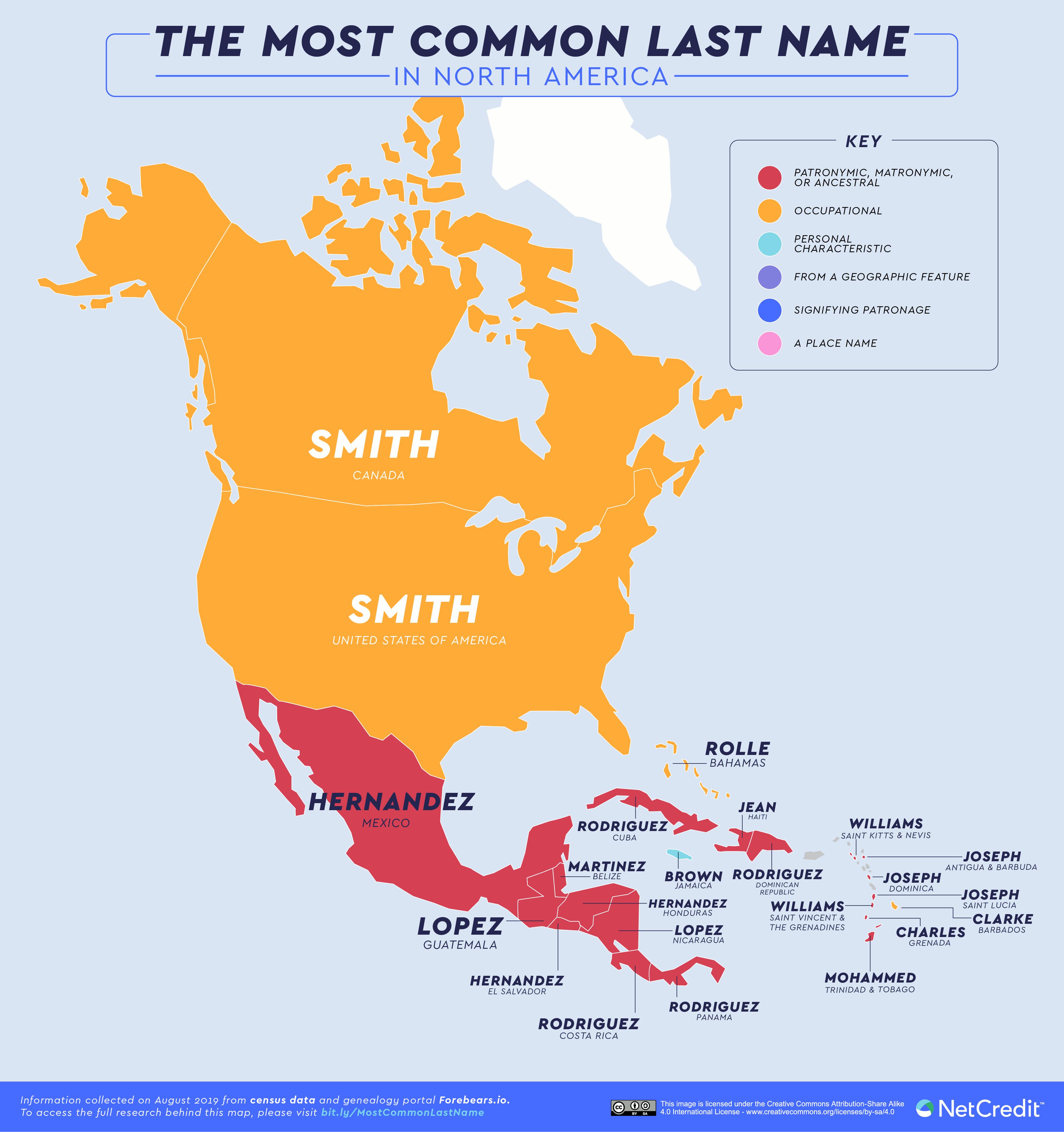
5. South America
Most of South America gained independence from Spain in the early 19th century, but many of the most popular surnames throughout the continent today are of Spanish origin. Gonzalez is the most common last name in Argentina, Chile, Paraguay and Venezuela. It is a patronymic from the Spanish personal name Gonzalo, which originally comes from the Germanic “gunþ”, meaning “battle”.
In Peru, the most common last name has indigenous roots. An estimated one in every 55 Peruvians shares the Aymaran surname Quispe, which derives from the Aymaran “qhispi”, meaning “glass” or “precious stone”.
In Guyana, the most common last name is Persaud, an altered form of the Indian Prasad. This name derives from the Sanskrit “prasāda”, meaning “favor”, “grace” or “offering”. Indian immigrants and descendants of Indian settlers make up an estimated 40% of Guyana’s population.
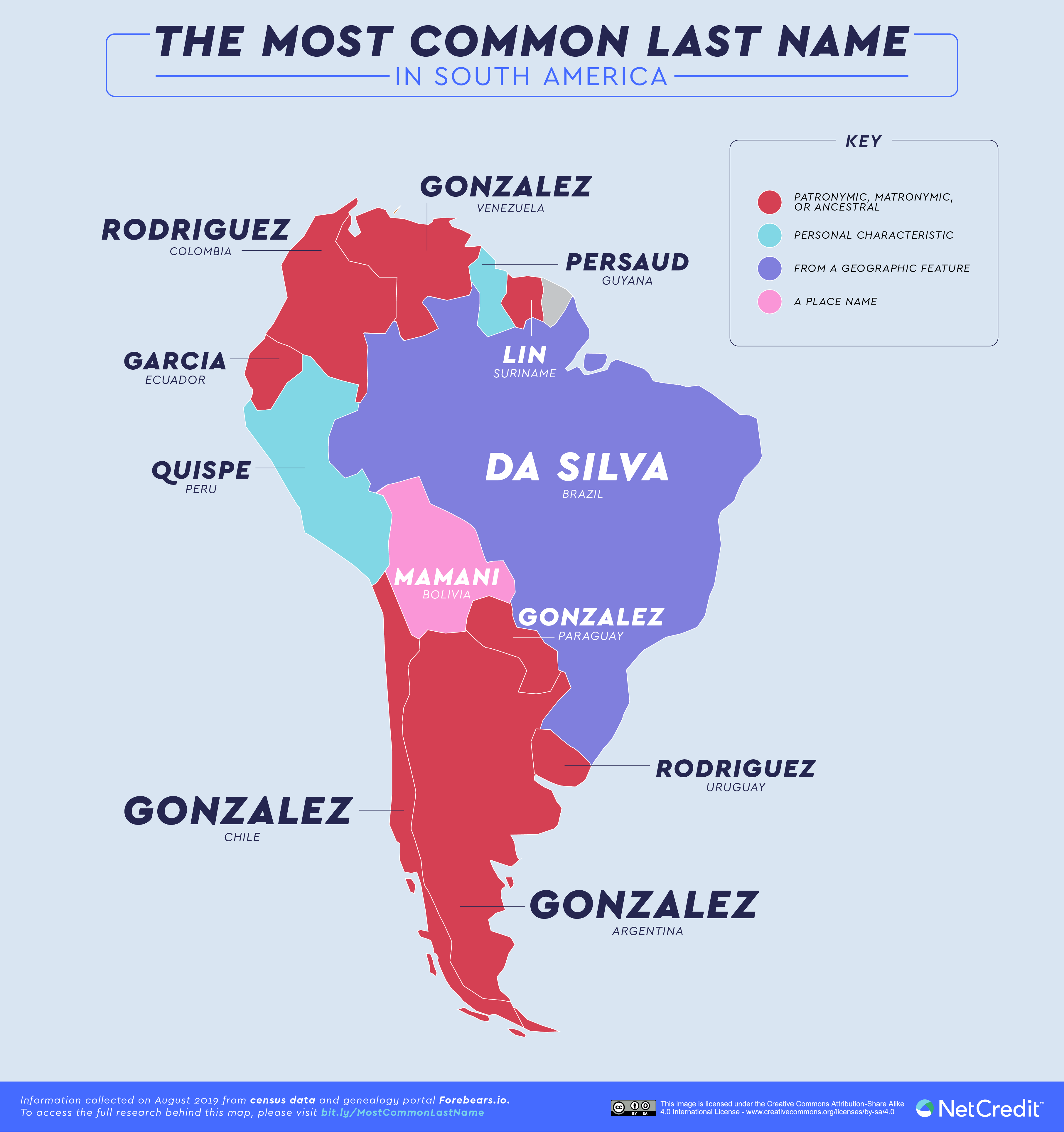
6. Oceania
The blend of popular surnames in Oceania reflects the region’s ethnic diversity. The most common surname in Australia and New Zealand is Smith, an Anglo-Saxon occupational name for a metal worker. In the Marshall Islands and Papua New Guinea, the most popular last name is the English John, meaning “Jehovah has favored (me with a son)”.
In the Federated States of Micronesia and the Solomon Islands, the most common surnames are of Japanese origin. Around one in 38 residents in Micronesia shares the name Mori. Mori originates from a Japanese character meaning “forest”, in reference to the sacred grove around a Shintō shrine. In the Solomon Islands, the most common surname is Mae, a Japanese name meaning “front” or “before”.
The most common surname in Fiji is Kumar, an Indian name that derives from the Sanskrit “kumāra”. It means “child”, “son” or “prince”. Indo-Fijians constitute approximately 38% of the country’s population.
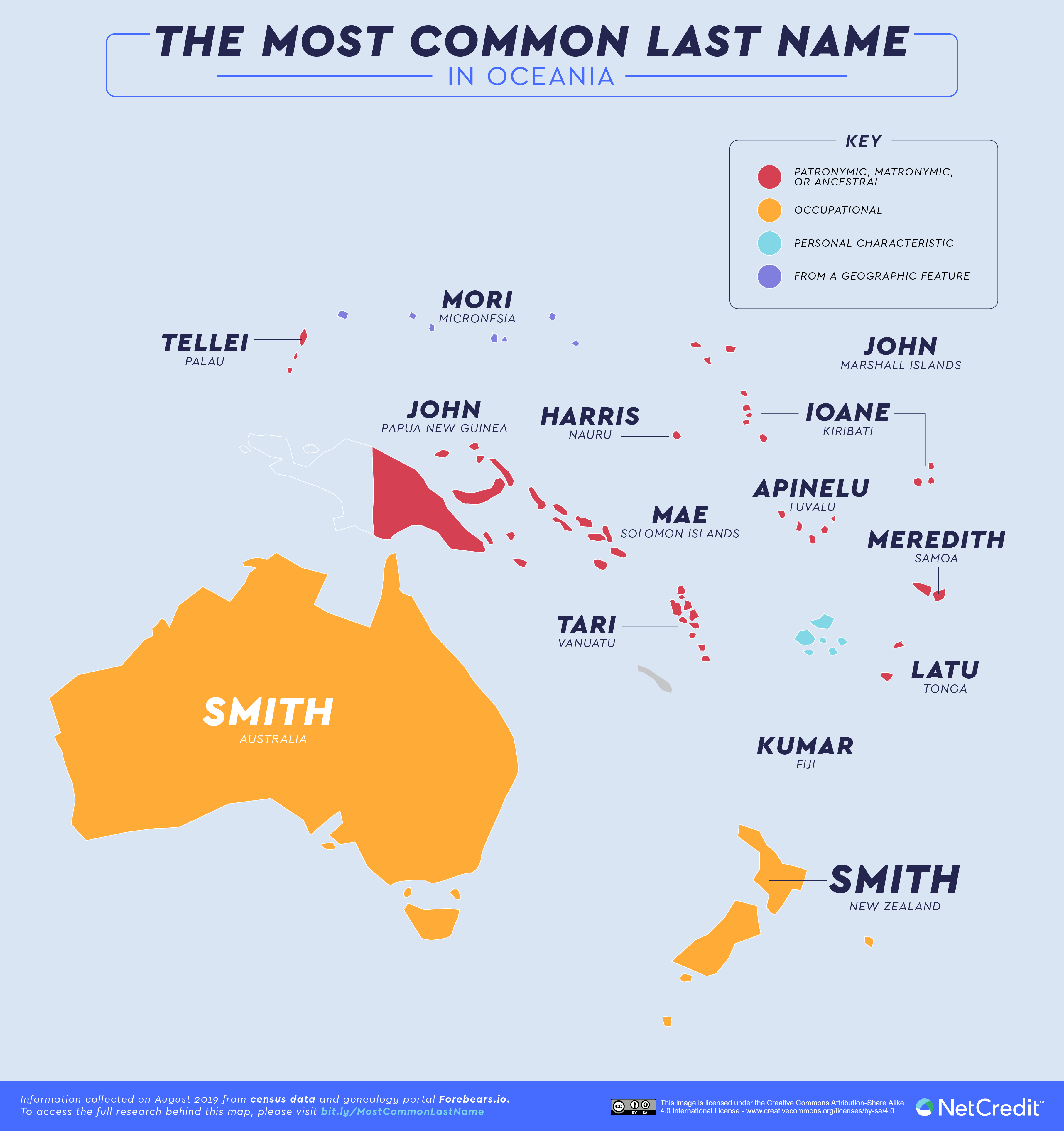
Summary
As popular as it may be in the United States, I had no idea that my last name would be on this list as the most common last name in Israel.
The study of surnames from country to country serves as a unique guide to the history of human civilization. Historians can form critical insights into culture and settlement patterns, genealogists can trace ancestral roots, and regular people can develop their sense of world-historical identity.
Today, humans are spread across 90 percent of the Earth; and human society is more culturally diverse than at any other point in history. The most common last names in every country remind us of our shared origins, and a time when the world was not so big.
Did your last name appear as the most common in any of the countries in the world?
Photograph ©2017 by Brian Cohen.

